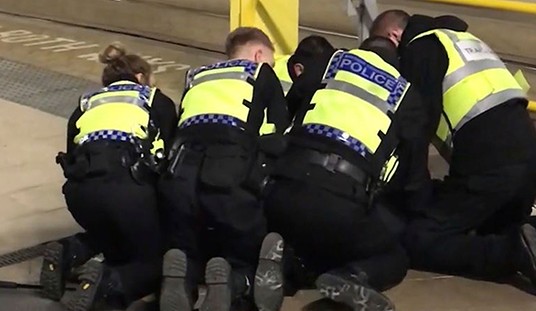In August, the Jerusalem Post revealed that J Street’s political action committee received contributions from Arab-, Iranian-, and Muslim Americans. State Department officials, a Palestinian billionaire, and board members of the discredited Human Rights Watch and the Iranian lobby were also listed in the files of the Federal Election Commission. Faced with the evidence, J Street’s director Jeremy Ben-Ami responded, “I think it is a terrific thing for Israel for us to be able to expand the tent of people who are willing to be considered pro-Israel and willing to support Israel through J Street,” he said.
Give me a break. That tent may have come directly from the Saudi king’s compound in Riyadh or Jidda. Research into J Street’s backers indicates a Washington cadre of paid Saudi agents, sycophants, and factotums. There are not many in that bunch who would be “willing to be considered pro-Israel.”
Consider the following PAC supporters or members of J Street’s advisory council:
- Nancy Dutton, widow of Fred Dutton, the long-time Saudi foreign agent, served as the Saudi Embassy’s attorney in Washington. As late as August 2008, news accounts identified her as the Saudis’ lawyer. She donates to J Street’s political action committee.
- Judith Barnett serves on J Street’s Advisory Council and donates to the J Street PAC. In fact, she was one of the very first of a handful of contributors to the J Street PAC after its formation in December 2007, according to the Federal Election Commission. She is clearly a believer in the “EMILY” political axiom: “Early money is like yeast, because it helps to raise the dough.”
A former deputy assistant secretary of commerce for the Middle East and Africa during the Clinton administration, Barnett worked for several Arab countries after she left office. After writing a toady piece in the Washington Post in early 2004 about the changing role of women in Saudi Arabia [“I found … that the role of Saudi women is changing far more quickly than most in the West realize.”], Barnett registered with the Justice Department as a foreign agent for Saudi Arabia. According to the Justice Department files, Barnett signed a contract to work with the PR firm, Qorvis, with whom the Saudis have a mega-buck contract to improve their post 9/11 image. Her contract ended a year later when security concerns prevented her from bringing a delegation of American women to Saudi Arabia.
In 2002 and early 2003, Qorvis popped up in the headlines when it was revealed that the agency had established a bogus “pro-peace” organization, the “Alliance for Peace and Justice,” which promoted the Saudi peace plan and slammed Israeli settlements. Qorvis had arranged for dozens of radio spots to be broadcast across the U.S. without divulging who was really behind the ads. In 2004, Qorvis’ offices were raided by the FBI for foreign agent violations.
Getting back to Barnett, she also set up her own consulting firm and affiliated with the international PA Consulting Group, where she worked for the Egyptian Ministry of Foreign Trade. Barnett’s activities are described in the Center for Public Integrity’s 2004 article titled “Saudis Drop Big Bucks for Washington Influence.”
- State Department official Lewis Elbinger, who served in Saudi Arabia, donates to J Street PAC. He provided an interesting address in the FEC files: 6300 Riyadh Place, Dulles, Virginia.
- Small donations are also provided to the PAC by at least two Saudi students, one in Dhahran, Saudi Arabia, and the other from Dhahran but residing in Texas.
- There’s also a tangential Saudi-J Street PAC tie through the recently discredited Human Rights Watch, which, according to a recent exposé, raises funds in Saudi Arabia. A senior HRW board member and member of J Street’s Advisory Council, Kathleen Peratis, is one of the largest donors to the PAC.
- But perhaps the most intriguing J Street PAC supporter is Ray Close, listed on the PAC’s latest FEC filings with a political contribution earmarked for J Street’s favorite congresswoman, Donna Edwards. Who is Close?
Ray Close served as CIA station chief in Saudi Arabia for more than 20 years. And then in 1977, he “went native.”
“On the day he retired from the CIA,” wrote reporter Eli Lake, “Ray walked across the street and joined Kamal Adham [the head of Saudi Arabia’s intelligence service] in a business relationship.” A former senior CIA official, Duane Clarridge, told Lake, “To many officers in the CIA this seemed untoward because as a government official, he had an official relationship with Kamal Adham. Now he was in a commercial relationship which over the years reportedly made Close a very wealthy man.”
The Saudis became the Close family business. Ray’s son, Kenneth, registered with the U.S. Justice Department as a foreign agent for the Saudis. According to Close Jr., he served as “senior policy advisor to HRH Prince Turki Al-Faisal while he was the Kingdom’s Ambassador to the United States. Ken Close continues to work closely with His Royal Highness on questions of policy, strategic investment, and Saudi-American business relations.”
Turki Al-Faisal is the author of the Saudi peace plan, which he restated in a New York Times column on September 12 without a hint of compromise or the peaceful confidence-building gestures toward Israel requested by President Obama. J Street, by the way, believes that “U.S. leadership can be deployed to normalize relations between Israel and the Arab world, utilizing the Arab Peace Initiative [Turki’s plan].”
Ray Close was an advisor to the Baker-Hamilton Iraq Commission in 2006 where he served on the “Expert Working Group.” [Yes, that Baker — former Secretary of State James Baker, author of the quote, “F*** the Jews. They don’t vote for us anyway.”] Beneath Close’s name on the Commission report is a short nondescript biography: “Freelance Analyst and Commentator on Middle East Politics.” In a memo to the Commission, Ray Close endorsed the Arab Peace Initiative as well as Hamas’ ascension to power in the Palestinian Authority: “There is nothing in those sensible and reasonable proposals that is nearly as threatening to the safety and security of Israel as is the fresh hostility generated by Israeli and American treatment of the struggling Palestinian administration [HAMAS] that was chosen in free and democratic elections last year. The Arab Initiative is a positive and constructive starting-point.”
The Commission and J Street have many points of agreement. The Baker-Hamilton recommendations provided the Obama administration with an excuse to jettison policies of the Bush administration: “Given the ability of Iran and Syria to influence events within Iraq,” the report stated, “the United States should try to engage them constructively. … The U.S. cannot achieve its goals in the Middle East unless it deals directly with the Arab-Israeli conflict and regional instability. There must be a renewed and sustained commitment by the United States to a comprehensive Arab-Israeli peace on all fronts: Lebanon, Syria, and President Bush’s June 2002 commitment to a two-state solution for Israel and Palestine.”
As an inducement to Syria, Ray Close suggested in his private memo to the commission: “Perhaps the U.S. will have to put pressure on Israel to make territorial concessions in the Golan.”
When the Chas Freeman controversy blew up earlier this year (the controversial former ambassador to Saudi Arabia was nominated to serve as President Obama’s chairman of the National Intelligence Council), Ray Close jumped to his friend’s defense.
Presumably, J Street’s defense of Freeman was purely coincidental. “It was only a matter of time,” wrote James Kirchick in Commentary, “before J Street — the self-proclaimed ‘pro-Israel, pro-peace’ organization that is neither — came to the defense of Tiananmen Square Massacre enthusiast Charles “Chas” Freeman. … Ben-Ami propagates the meme that it was Freeman’s statements on Israel — awful as they were — that ultimately ended his career, despite all the evidence to the contrary.”
Five years ago, well before the Freemen affair, Close was warning of a “neo-con cabal” in Washington.
Paranoid conspiracy theorists believe in Washington cabals, and this article does not suggest that a Saudi cabal lies behind J Street. But the article does scream the question: Why are so many Saudi-affiliated individuals — as well as Iranian lobby supporters, Arab American leaders, Palestinian and Islamic activists — attracted to J Street like a magnet?
Progressive American supporters of Israel deserve organizations that are transparent and reveal their financial supporters and decision-makers. An indulgent media — in the U.S., Israel, and the Jewish press — so far has avoided probing these points.









Join the conversation as a VIP Member